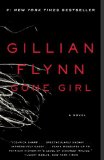Summary | Excerpt | Reading Guide | Reviews | Beyond the Book | Readalikes | Genres & Themes | Author Bio

A Novel
by Gillian Flynn
I had a job for eleven years and then I didn't, it was that fast. All around the country, magazines began shuttering, succumbing to a sudden infection brought on by the busted economy. Writers (my kind of writers: aspiring novelists, ruminative thinkers, people whose brains don't work quick enough to blog or link or tweet, basically old, stubborn blowhards) were through. We were like women's hat makers or buggy-whip manufacturers: Our time was done. Three weeks after I got cut loose, Amy lost her job, such as it was. (Now I can feel Amy looking over my shoulder, smirking at the time I've spent discussing my career, my misfortune, and dismissing her experience in one sentence. That, she would tell you, is typical. Just like Nick, she would say. It was a refrain of hers: Just like Nick to . . . whatever followed, whatever was just like me, was bad.) Two jobless grown-ups, we spent weeks wandering around our Brooklyn brownstone in socks and pajamas, ignoring the future, strewing unopened mail across tables and sofas, eating ice cream at ten a.m. and taking thick afternoon naps.
Then one day the phone rang. My twin sister was on the other end. Margo had moved back home after her own New York layoff a year before — the girl is one step ahead of me in everything, even shitty luck. Margo, calling from good ole North Carthage, Missouri, from the house where we grew up, and as I listened to her voice, I saw her at age ten, with a dark cap of hair and overall shorts, sitting on our grandparents' back dock, her body slouched over like an old pillow, her skinny legs dangling in the water, watching the river flow over fish-white feet, so intently, utterly self-possessed even as a child. Go's voice was warm and crinkly even as she gave this cold news: Our indomitable mother was dying. Our dad was nearly gone — his (nasty) mind, his (miserable) heart, both murky as he meandered toward the great gray beyond. But it looked like our mother would beat him there. About six months, maybe a year, she had. I could tell that Go had gone to meet with the doctor by herself, taken her studious notes in her slovenly handwriting, and she was teary as she tried to decipher what she'd written. Dates and doses.
"Well, fuck, I have no idea what this says, is it a nine? Does that even make sense?" she said, and I interrupted. Here was a task, a purpose, held out on my sister's palm like a plum. I almost cried with relief.
"I'll come back, Go. We'll move back home. You shouldn't have to do this all by yourself."
She didn't believe me. I could hear her breathing on the other end.
"I'm serious, Go. Why not? There's nothing here."
A long exhale. "What about Amy?"
That is what I didn't take long enough to consider. I simply assumed I would bundle up my New York wife with her New York interests, her New York pride, and remove her from her New York parents — leave the frantic, thrilling futureland of Manhattan behind — and transplant her to a little town on the river in Missouri, and all would be fine.
I did not yet understand how foolish, how optimistic, how, yes, just like Nick I was for thinking this. The misery it would lead to.
"Amy will be fine. Amy . . ." Here was where I should have said, "Amy loves Mom." But I couldn't tell Go that Amy loved our mother, because after all that time, Amy still barely knew our mother. Their few meetings had left them both baffled. Amy would dissect the conversations for days after —"And what did she mean by . . . ," as if my mother were some ancient peasant tribeswoman arriving from the tundra with an armful of raw yak meat and some buttons for bartering, trying to get something from Amy that wasn't on offer.
Amy didn't care to know my family, didn't want to know my birthplace, and yet for some reason, I thought moving home would be a good idea.
Excerpted from Gone Girl by Gillian Flynn. Copyright © 2012 by Gillian Flynn. Excerpted by permission of Crown, a division of Random House, Inc. All rights reserved. No part of this excerpt may be reproduced or reprinted without permission in writing from the publisher.
Your guide toexceptional books
BookBrowse seeks out and recommends the best in contemporary fiction and nonfiction—books that not only engage and entertain but also deepen our understanding of ourselves and the world around us.